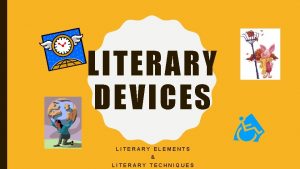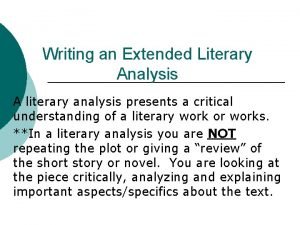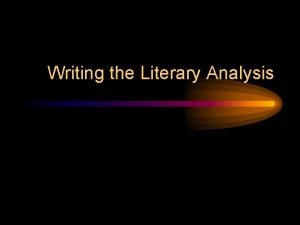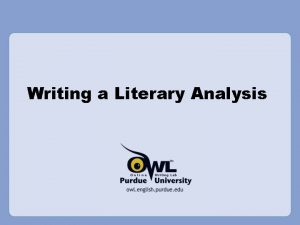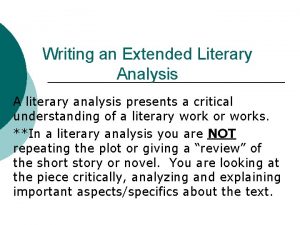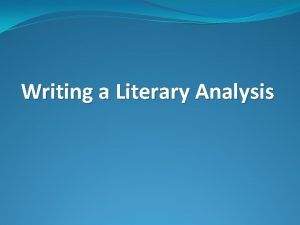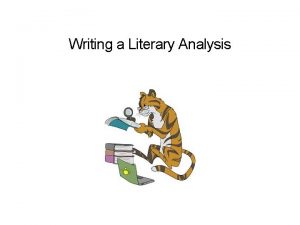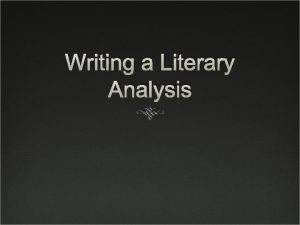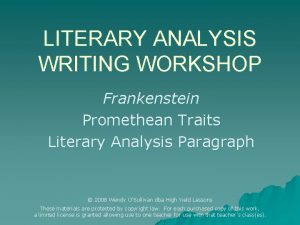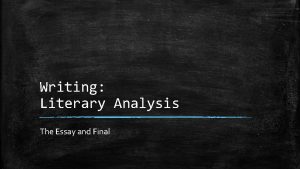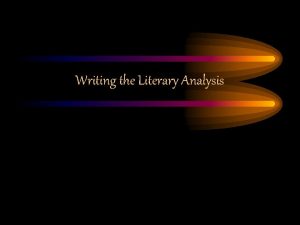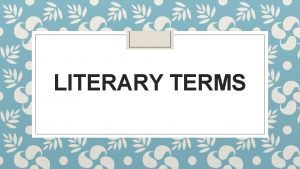Writing the Literary Analysis What is Literary Analysis
















- Slides: 16

Writing the Literary Analysis

What is Literary Analysis? • • • It’s literary It’s an analysis It’s-An Argument! Usually, a literary analysis will involve a discussion of a text as writing, thus the term literary, which means “having to do with letters”

Important literary concepts • The Basics – – – Plot/Setting Narration/point of view Characterization Symbolism Metaphor Tone/diction/syntax/ imagery – Genre – Irony/ambiguity • Other key concepts – Historical context – Social, political, economic contexts – Ideology – Multiple voices – Various critical orientations – Literary theory

How Can I Learn More? • There are various handbooks of literary terms available in most libraries. • There are numerous introductions to literary criticism and theory that are widely available. • Example: A Handbook to Literature. Harmon/Holman

What is an Analysis? • An analysis of a literary work may discuss – How the various components of an individual work relate to each other – How two separate literary works deal with similar concepts or forms – How concepts and forms in literary works relate to larger aesthetic, political, social, economic, or religious contexts

How is a literary analysis an argument? • When writing a literary analysis, you will focus on specific attribute(s) of the text(s). • When discussing these attributes, you will want to make sure that you are making a specific, arguable point (thesis) about these attributes. • You will defend this point with reasons and evidence drawn from the text. (Much like a lawyer!)

About Thesis Statements • A thesis can be either simplistic or sophisticated. • It is important to remember that thesis statement controls the entire composition – a focused, concise thesis statement will give you a greater chance of producing writing that clearly communicates your argument.

Which is the best thesis statement? • • Moby-Dick is about the problem of evil. Moby-Dick is boring and pointless. Moby-Dick is about a big, white whale. The use of “whiteness” in Moby-Dick illustrates the uncertainty about the meaning of life that Ishmael expresses throughout the novel.

Which is the best thesis statement? • The fourth option, while not scintillating, is the one thesis statement on the list that could be developed and supported throughout an essay. • What is wrong with the first three options: – Option 1 is too broad and abstract – Option 2 is only appropriate if you are asked to recommend or not recommend a book to those who haven’t read it; it doesn’t offer an interpretation of the book – Option 3 is excessively obvious

Easy-Peasy Thesis Statements • So now you’re thinking, “That’s nice and all, but how do I do this? ” • Here’s an easy-peasy thesis helper: • In (title of novel or poem), (Author’s name) uses (1 st lit device), (2 nd lit device), and (3 rd lit device) to (depict, criticize, explain, etc. ) (some aspect of human life).

Easy-Peasy Thesis Statements • Let’s see what this might look like: • In The Catcher in the Rye, author J. D. Salinger employs first person narration, colloquial diction, and a cynical tone to depict the conflict within the protagonist’s psyche as he struggles to connect with the world around him on an adult level. • The most important part of this is what happens after the word TO!

How do I support a thesis statement? • Examples from the text: – Direct quotations – Summaries of scenes – Paraphrase • Other critics’ opinions • Historical and social context • Always remember to read carefully and highlight useful passages and quotes!

How do I avoid superficiality? • This is HUGELY important: If all you do in one body paragraph is to give a few examples of irony from the text and identify them as irony, then you haven’t analyzed anything! • The analysis part involves explaining how those examples are ironic, and how they help to communicate your thesis (i. e. how they help to communicate theme). • You must interpret what the author has given you to work with. This is the SO WHAT that you will often hear me say in our class.

Next: Draft Topic Sentences • Once you have a solid thesis: • Compose 4 -5 Topic Sentences that support, explore, demonstrate, explain, or illustrate your thesis. Always begin your body paragraphs with a Topic Sentence (a claim); NEVER begin a body paragraph with a quotation or summary sentence.

Find Evidence • Select specific passages that offer the reader evidence of your claim. • Incorporate only the most important phrases into each paragraph. Use ellipses if needed.

Build your Paper to a Climax • Save your most engaging or important topic sentence for your last body paragraph. • Conclude your paper with a paragraph that does more than simply summarize your main points. You may wish to echo your opening interest device or end with an insight.
 Journalistic writing
Journalistic writing Hình ảnh bộ gõ cơ thể búng tay
Hình ảnh bộ gõ cơ thể búng tay Frameset trong html5
Frameset trong html5 Bổ thể
Bổ thể Tỉ lệ cơ thể trẻ em
Tỉ lệ cơ thể trẻ em Chó sói
Chó sói Chụp phim tư thế worms-breton
Chụp phim tư thế worms-breton Hát lên người ơi alleluia
Hát lên người ơi alleluia Môn thể thao bắt đầu bằng chữ f
Môn thể thao bắt đầu bằng chữ f Thế nào là hệ số cao nhất
Thế nào là hệ số cao nhất Các châu lục và đại dương trên thế giới
Các châu lục và đại dương trên thế giới Cong thức tính động năng
Cong thức tính động năng Trời xanh đây là của chúng ta thể thơ
Trời xanh đây là của chúng ta thể thơ Mật thư anh em như thể tay chân
Mật thư anh em như thể tay chân 101012 bằng
101012 bằng độ dài liên kết
độ dài liên kết Các châu lục và đại dương trên thế giới
Các châu lục và đại dương trên thế giới

















